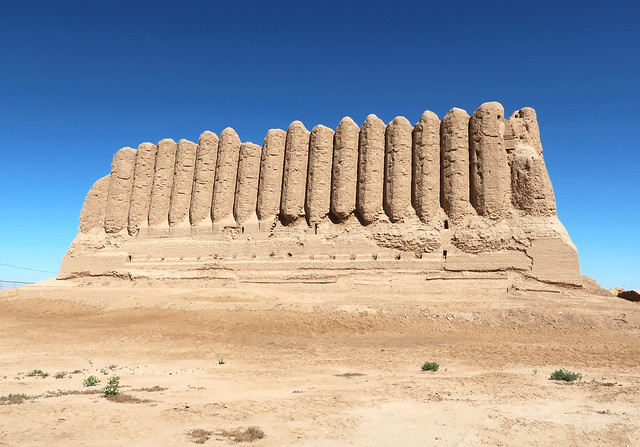Kyz Kala: Die Jungfrauenfestung mit der Welle
GaiJorayev, The Great Kyz Kala in 2006, CC BY-SA 4.0
Die Große Kyz Kala in der Wüste von Turkmenistan; Bildquelle Wikimedia Commons
Vorab: Die Wissenschaft weiss nichts über die Entstehung oder den Zweck dieser Anlage am Ort Merv in der Wüste Turkmenistans. Angeblich kann man Kyz Kala nur ein Bestehen seit 2.000 v. Chr. nachweisen. Andere beschränken sich darauf, zu behaupten, dass diese Anlage außerhalb der Stadtmauern von Merv erst ein Ergebnis des 7. Jahrhunderts n. Chr. seien. Es soll sich um zwei Festungen handeln, von denen die eine als große Kyz Kala und die andere als kleine Kyz Kala genannt wird. Die Überreste vergangener Kulturen stehen recht nah beieinander. National Geographic spricht von den „Überresten einer zerstörten Struktur mit ungewissem Plan“.
Abbildung via Flickr-Link (klickt auf das Bild oder den Autoren): © John Pavelka
Manche behaupten, das Zentrum Merv habe im 12. Jahrhundert die wohlhabenden Handelswege der Seidenstraße dominiert und vermutet dort in der Vergangenheit etwa eine halbe Million Menschen. Außerdem soll es wieder einmal der böse Dschingis Khan gewesen sein, der nach einer grausigen Eroberung 700.000 Tote verschuldet habe (sowohl diese Geschichte als auch die Zahl der Toten darf bezweifelt werden). Jedenfalls ein El Dorado voller Kanäle und Brücken, Gärten und Obstgärten – eine grüne und reich kultivierte Oase inmitten der Karakum-Wüste. Warum sollte ein Eroberer so etwas mutwillig zerstört haben? Die für mich immer wiederkehrende Frage. Dämme und Deiche am Fluss Murghab sowie ein Netz von Kanälen und Stausee bildeten schließlich die Existenzgrundlage dieses fruchtbaren Ortes, der auch Eroberern hätte von Nutzen sein können.
Mark and Delwen, Mervturkmenistan, CC BY 2.0
Der kleine Bruder Erk Kala in der Nachbarschaft; aus der Luft sieht dieser Standort buchstäblich aus wie geschmolzen - die Überreste sind kärglich.
John Pavelka from Austin, TX, USA, Erk Kala Citadel (28527290218), CC BY 2.0
Hier enochmals die "Zitadelle" von Erk-Kala aus nächster Nähe
Die umgebenden Mauern der Stadt verliefen in einem länglichen Kreis über eine Entfernung von 8 km. Die Stadt war bekannt als Marv-i-Shahijan oder „Merv der Große“, die größte und berühmteste einer Reihe von Städten in der Merv-Oase. Tatsächlich befand sich die Stadt neben einer früheren Version von Merv etwas weiter im Osten, auch bekannt als Gyaur-kala („Festung der Heiden“).
Die Halbsäulen der Außenwände und die Sache mit der Erosion
Ziegler175, MAMerwKyzKala, CC BY-SA 4.0
Reste einer stark in Mitleidenschaft gezogenen, einst imposanten Fassade
Der Kyz Kala Komplex besteht aus erheblichen irdenen Gebäuden, die normalerweise auf erhöhten Plattformen errichtet werden, wobei vertikale Säulen an den Außenwänden 15 Meter hohe „Wellen“ aus Lehmziegeln bilden. Jede Riffelung ist im Grundriss halb achteckig mit einem Durchmesser von ca. 1,30 m. Leider ist ein Großteil der Erosion zum Opfer gefallen. Möglicherweise gab es auch noch ganz andere katalytische Ereignisse, die das Gemäuer in Mitleidenschaft gezogen haben könnten. Immerhin sollen Zugänge von „Regen“ und „Verwitterung“ verschüttet worden sein, was äußerst seltsam erscheint: Regenfälle findet man im gesamten Land nämlich eher selten. Im Durchschnitt fallen etwa 100-300 mm Regen pro Jahr. Aktuelle Laserscandaten liefern Außenabmessungen von 46,52 × 36,20 m. Das ai-journal.com räumt ein, dass es sich hier trotz Fort-ähnlichem Aussehen eher um ein defensives Gemäuer gehandelt haben muss, ähnlich einem mittelalterlichen Herrenhaus.
Hergit, GreatKyzKala3, CC BY-SA 3.0
Am heute immer noch glatt wirkenden Sockel sieht man, wie sehr diese Struktur oberhalb unter die Räder gekommen ist. Entweder fanden seinerzeit modernere Kriege statt, als wir sie uns nach heutigen Maßstäben vorstellen können oder kataklystische Ereignisse haben beim Verfall noch etwas nachgeholfen. Die Wände sind nämlich im Grunde ausreichend dick angelegt gewesen, um diese Zeitspanne unbeschadet zu überstehen. Mit Verwitterungen oder etwas Regen in der Wüste ist dieser Abbruch aus meiner Sicht jedenfalls nicht zu erklären.
Wie immer gibt es zu solchen ungeklärten burgähnlichen Anwesen auch viele Sagen und Legenden. Deshalb hat sich auch in der Überlieferung der Begriff „Jungfrauenburg“ oder „Mädchenfestung“ etabliert, da ein König einst seine Tochter vor den frivolen Lastern des Ortes Merv beschützen wollte und ihr deshalb diese Trutzburg errichtet haben soll. Sicherlich nicht besser oder schlechter als jegliche andere Theorie. Tatsache ist, dass ein Gebäude mit dieser Architektur an anderer Stelle bis heute nicht wiederzufinden ist.
